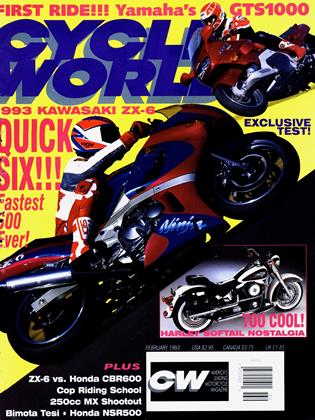OXYGENATED FUEL AND THE MOTORCYCLIST
To REDUCE URBAN LEVELS of carbon monoxide, the government has mandated the use of oxygenateschiefly ethyl alcohol or MTBE (methyl tertiary butyl ether) in pump fuel sold in selected regions of the U.S. during winter months. This tactic is being used to lean out the fuel mixtures of rich-running older cars, which have been targeted as major sources of pollution now that new vehicles have reached very low emission levels. With oxygenates supplying extra oxygen in the fuel, carbon dioxide will be emitted instead of the poisonous carbon monoxide.
Some owners of older ma-
chinery are concerned about possible ill effects from these new fuel components. First, alcohols can absorb water from the atmosphere or from contaminated storage tanks. This can lead to separation of the wateralcohol component from the fuel, or to water-related fuel system corrosion. Flowever, the biggest water-absorber-methyl alcohol-is not used in the current program. MTBE absorbs little water and is not a problem, and ethyl alcohol will be used at low concentrations of 10 percent or less.
Fuel systems in some vehicles built before 1975 may have problems that result from deterioration of organic-based
parts such as hoses, float-needle tips and plastic floats, but post-1975 fuel systems are designed for the higher levels of aromatics (chiefly toluene) used to restore anti-knock ratings of unleaded or low-lead fuels. Organic parts that survive in aromatics are likely to survive the oxygenates as well.
As to performance with these new fuels, perfectly carbureted vehicles will see a small power and mileage loss-perhaps 3 percent. Older machines that are comfortably rich may actually run slightly better. So there seems little reason for riders of most current motorcycles to worry about having to use this winter fuel. -Kevin Cameron
 View Full Issue
View Full Issue
More From This Issue
-
 Up Front
Up FrontOr Best Offer
February 1993 By David Edwards -
 Leanings
LeaningsThe Ducks of Autumn
February 1993 By Peter Egan -
 TDC
TDCComputers Vs. Intuition
February 1993 By Kevin Cameron -
 Letters
LettersLetters
February 1993 -
 Roundup
RoundupIndian Wars Continue
February 1993 By Jon F. Thompson -
 Roundup
RoundupReturn of the Rumi
February 1993 By Alan Cathcart







